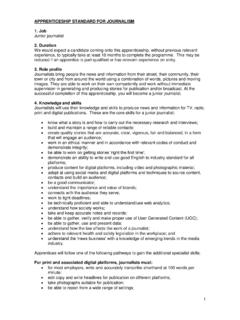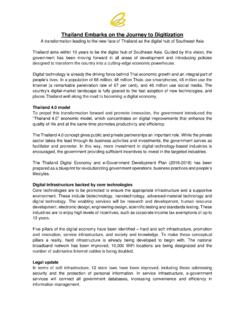Transcription of Emerging skills - nctj.com
1 Emerging skills for journalists An independent research report commissioned by the National Council for the Training of Journalists September 2014. Acknowledgements Author: Mark Spilsbury Thanks are due to the respondents across the publishing, broadcasting, education and training sectors who gave their time to this research and whose insightful views inform this report. Particular thanks for their input and support are owed to Joanne Butcher, chief executive, and Stephen Mitchell, Malcolm Vickers and other board members of the National Council for the Training of Journalists.
2 All views and opinions expressed within this report are those of the author and are not necessarily shared by the National Council for the Training of Journalists. NCTJ 2014. Apart from fair dealing for the process of research or private study and only as permitted under the Copyright Designs and Patents Act 1988, this publication may only be reproduced, stored or transmitted in any form or by any means with the prior permission in writing of the NCTJ. Contents Executive summary 4. 1 Introduction 6. 2 Drivers of change 7. Developments in the business environment 7.
3 Leveson 9. Change to IT and digitisation 11. 3 Impacts 13. Impact on employment levels 13. Changing sectoral employment of journalists 14. Changing age balance of journalists 17. Maintaining quality 18. Working across different platforms 23. Relationships with the audience 24. Photographic skills 26. 4 Continuing skills and professional development 27. Entry into journalism 27. New and enhanced skills needed 28. Provision of training 29. Consultation on training provision 30. 5 Conclusions 31. 3. Executive summary Background The world in which journalists work is fast-changing.
4 This research project has been commissioned to identify the issues that are affecting journalism and the impacts that these changes are having. The research will feed directly into the provision of journalism training, via the NCTJ's development strategy and five year plan, but is also a contribution to the wider discussion on the development of journalistic skills . This project is a qualitative research project, which has identified (i) the factors driving change in the journalism profession, (ii) the impacts of these forces, and (iii) the implications for continuing professional development and training of journalists.
5 The research process included the drafting of an initial issues paper', following this with a consultation paper, which was circulated across all parts of the publishing and broadcast industry. This yielded some 20 responses, from educators, employers, employer representatives, and representatives of individual journalists which have been gathered together, along with the earlier inputs, into this final report. The advantage of this approach is that it has allowed respondents to fully consider their responses to the complex issues that are at play.
6 The report discusses (i) the drivers of change (those factors which are behind much of the change in the industry); (ii) the impacts (the changes that we are seeing in journalism as a result of the drivers of change); and (iii) continuing professional development and training (the implications of the drivers of change and their impact on the training of journalists). The drivers of change The drivers of change identified in this report include: the business environment: the business model underpinning most forms of publishing has come under pressure from the alternative options provided by development of the internet.
7 Circulation sales have fallen as more people seek their information on-line and (for regional and local newspapers) because of the growth of free newspapers. Advertising revenues have diminished as much classified advertising has migrated to the internet, particularly house sales and recruitment advertising. There is little doubt that for the regional and local newspaper sectors times have been very hard, and as a result, there has been cost cutting and falling investment. Some of the developments in the broadcast sector have been similar to that of publishing, with commercial broadcasting subject to the same pressures brought upon by the recession (falling advertising revenues, etc), but not the same technological changes that have put publishing under such pressure Leveson: hanging over much of the publishing world is the impact, if any, of the implementation of the recommendations in the Leveson report (and the associated political debate).
8 Although the full implications of the changes to the regulatory systems have yet to be seen there are already divergent views Emerging . At the one end, the view is that it will lead to risk-averse journalism, with journalists being cowed'. On the other hand, some consider that the Leveson inquiry may have already improved journalism practices the need to better articulate the public interest acts as an extra discipline, which (some argue) is healthy, that checks on journalists' behaviour and may lead to journalists being more thoughtful in their investigative behaviour IT and digitisation: changes to IT and the move to digitisation has impacted on the way that journalists work in two main ways: an increase in the range of platforms on which to publish their output.
9 There is a rapidly Emerging need for bespoke, on-demand news services, with stories being constantly updated to be accessed by the user' in a variety of vehicles tablets, laptops, mobile phones, etc. The development of content for these different platforms require different skills journalists now have to be able to write and produce for these different media the use of online methods to gather information, including (i) social media and (ii) statistical data These forces have created, and will continue to create, dramatic changes within journalism.
10 4. The impacts The core skills of journalism remain the same find the story, check it, double-check it, simplify it, put it into context and communicate it in a way that interests the consumer. But, the way that journalists do their jobs is changing as a result of the drivers' we have identified above. Particular impacts are that: whilst the number of journalists has not decreased as much as is popularly believed, there have been declines in specific sectors counterbalanced by increases in employment elsewhere as journalists (i) move into self- employment/freelancing and (ii) move into PR and corporate communications.






